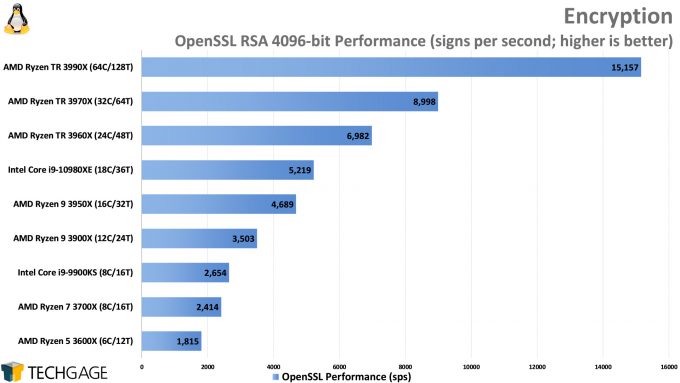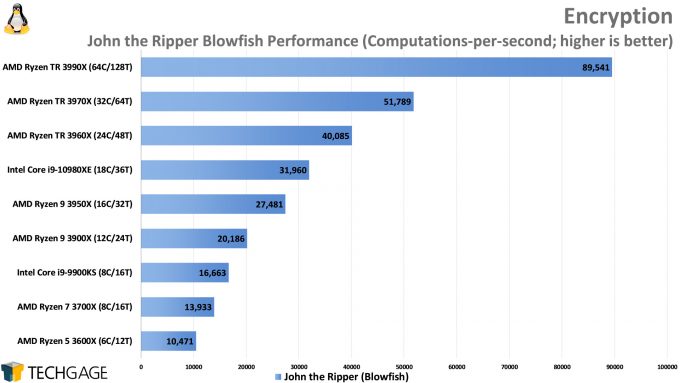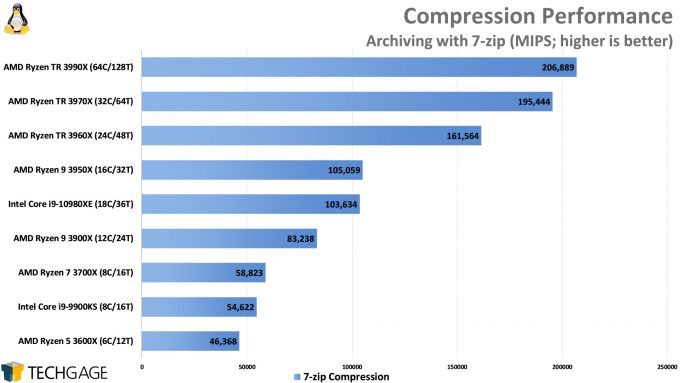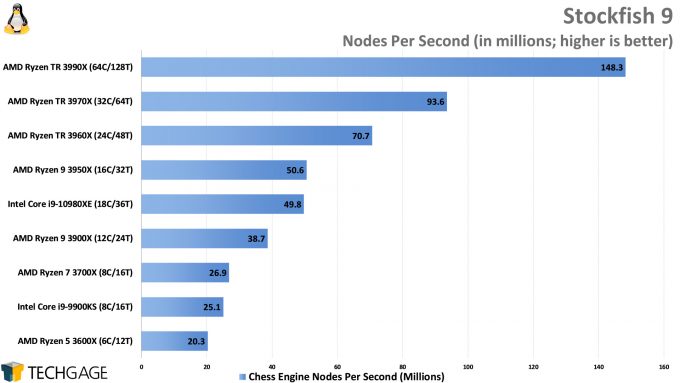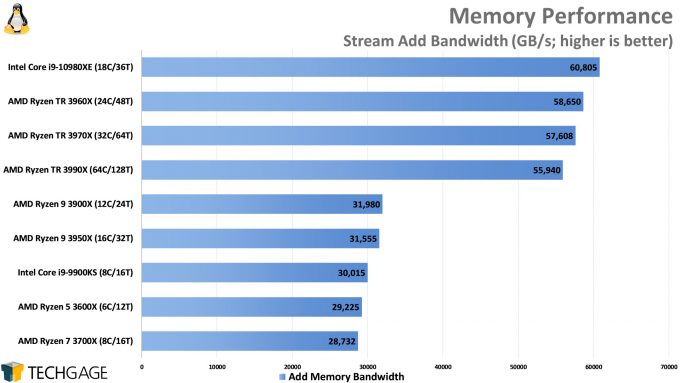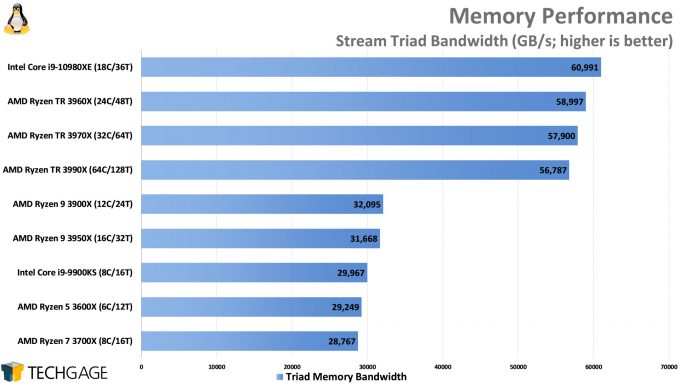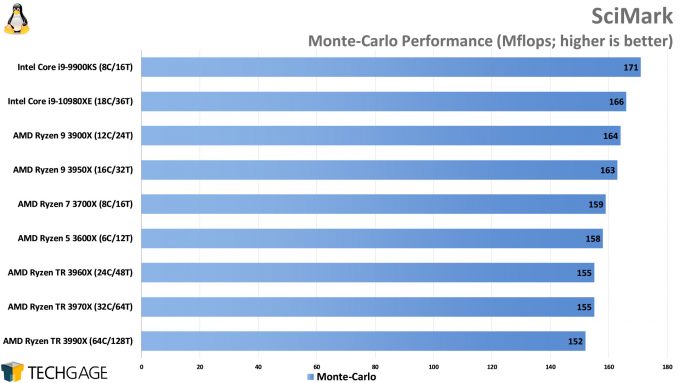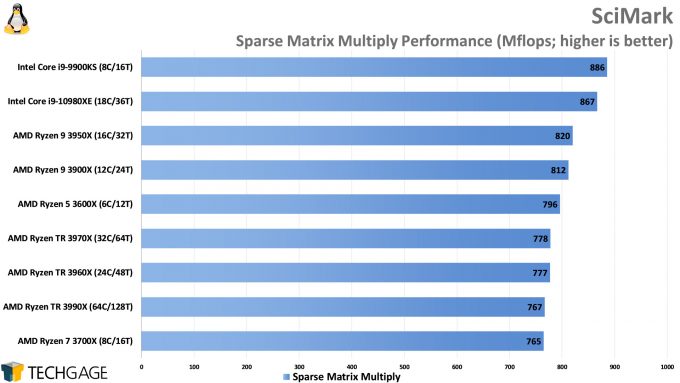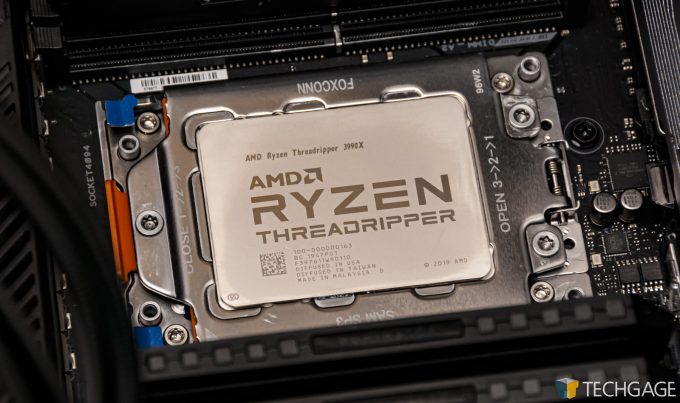- Qualcomm Launches Snapdragon 4 Gen 2 Mobile Platform
- AMD Launches Ryzen PRO 7000 Series Mobile & Desktop Platform
- Intel Launches Sleek Single-Slot Arc Pro A60 Workstation Graphics Card
- NVIDIA Announces Latest Ada Lovelace Additions: GeForce RTX 4060 Ti & RTX 4060
- Maxon Redshift With AMD Radeon GPU Rendering Support Now Available
A Linux Performance Look At AMD’s 64-core Ryzen Threadripper 3990X Processor

AMD’s latest Ryzen Threadripper has arrived, and it brings along some impressive specs with it. We’re talking 64 cores, 128 threads, 288MB of cache, and a price tag of $3,990 USD. To kick off our look at AMD’s 64-core monster, we’re going to start with our deluge of tests under Linux, including compiling, rendering, and science.
Page 3 – Encryption, Compression & Memory Performance; Final Thoughts
The previous pages have been focused on specific scenarios, like science, rendering, and compiling, so to wrap things up, this page is going to revolve around some more general scenarios, like encryption, compression, and memory bandwidth. For good measure, a chess engine even makes an appearance.
We’ve been lacking more single-threaded tests in the past, but have some SciMark-sourced ones here. We’re still not sure if they are ideal, but they serve the purpose for now. As always, if you have a suggestion of another test we should implement, please leave a comment.
Encryption Performance
The first results from this page seem to agree with V-Ray Bench from the first page. We’re seeing nearly 70% performance improvement with both the OpenSSL and Blowfish tests. We wish we’d see this kind of scaling all of the time.
7-zip Compression Performance
When the second-gen Threadripper came out, we quickly learned that so many cores would wreak havoc with certain software. At launch, the 32-core 2990WX didn’t gain much at all in 7-zip in Windows, but Linux accelerated it just fine. Interestingly, as we move forward to this 64-core launch, we’re not seeing much improvement at all. It even seems to suggest that this software is simply not going beyond 64 threads, but we used HTOP to validate that it was. This could be an example of software that needs to be tuned to scale higher than it’s currently able to. Higher memory bandwidth wouldn’t hurt, either.
Chess Engine Performance
It doesn’t seem likely that any chess fanatic would run out to purchase a 64-core CPU for chess engine use, but isn’t it great to see that such a niche function scales incredibly well? This scaling isn’t quite up to par with the OpenSSL result earlier, but +58% over the 3970X is nothing to balk at.
Memory Bandwidth
Memory bandwidth for the 3990X is similar to the other Threadrippers, but it lags a bit behind them overall. Intel’s top-end Core i9-10980XE shows some great strength here, although the roles reverse a bit in the Windows version of this test (run through SiSoftware Sandra). In both OSes, the 3990X sits behind the other Threadrippers.
Single Threaded Performance
Both of these SciMark single-threaded tests love Intel’s CPUs, with both of those included here keeping to the top of the chart. As mentioned at the top of the page, if you have ideas for other single-threaded tests in Linux, please let us know. The 3990X, almost not surprisingly, falls behind the others, despite having a higher single-thread clock speed than some of them. What you may lack in single-threadedness, you gain back handsomely with threads.
Final Thoughts
Across the few dozen performance charts here, we’ve seen AMD’s new 64-core Ryzen Threadripper 3990X perform great overall, at least if the workload calls for many cores, and can take proper advantage of them. As was the case with the 24- and 32-core Threadrippers in late 2018, the 64-core 3990X is definitely not a one-size-fits-all processor.
As talked about in the intro, even if money is no concern, you would not be better off buying the 3990X over a smaller Ryzen in all situations. You need a reason for the 3990X, and at the forefront, that involves uses like 3D rendering, mathematics, or even in some cases, compiling. Video encoding can also be included in this list, as long as the codec complements many cores. You should be good with the pro formats, but consumer formats will likely struggle to take advantage of more than 64 threads.
For those who can take advantage of as many cores as they are given, the Ryzen Threadripper 3990X is an outstanding processor. In most cases where multi-threadedness is properly supported, the gains of the 3990X over the 32-core 3970X are huge – certainly not double, but oftentimes hovering around 50%, and going up to 70%.
The fact that we’re not seeing doubled performance may be why there is no 48-core SKU in this updated Threadripper lineup. Both that and this 64-core would rub against each other too much. That said, AMD’s EPYC lineup has multiple 48- and 64-core options, all of which are priced above this 3990X.
It should be obvious at this point whether or not 64 cores is for you, and whether or not your needs justify its cost. Fortunately, if this chip doesn’t do the trick, AMD has the more modest 24- and 32-core options available.
When all is said and done, how could we not give this beast an Editor’s Choice award? It offers unmatched performance in many ways, and is a technical marvel at the same time. It was only a few years ago that AMD pushed eight-cores to the mainstream, and now we have a 64-core for the ultra-high-end. That kind of momentum is incredible, and means we might be waiting a little while for a return punch from Intel.

AMD Ryzen Threadripper 3990X 64-core Processor
Pros
- A single desktop processor with 64 cores!
- Can utilize fast memory like the smaller Threadrippers.
- Bundles in 288MB of cache.
- While expensive, the 3990X offers great value for specialized workloads.
Cons
- Most workloads cannot take proper advantage of such a large processor. Software needs to catch up.
Support our efforts! With ad revenue at an all-time low for written websites, we're relying more than ever on reader support to help us continue putting so much effort into this type of content. You can support us by becoming a Patron, or by using our Amazon shopping affiliate links listed through our articles. Thanks for your support!




